Are you a fan of all things Italian? You might love to host a student from Italy, but read this first!
Every year hundreds of Italian mammas and papás kiss their teenagers goodbye at the airport… Meanwhile, across the USA, eager host families wait to greet each one. Would you like to join in the fun? This guide will help you decide - and make the most of the hosting experience:
- What should you know about Italian culture?
- How can an Italian student enrich your life?
- How can you share American culture?
- Is an Italian student a good fit for your family?
- How can you host happily ever after?

Vanessa saying goodbye to her parents in Rome before heading to Colorado to meet her new American host family and spend a year at an American high school.
A big thank you to Italian students Vanessa (Rome) and Alice (Milan) for sharing photos, fun, and advice from their year in the USA.
 Alice (front center) from Milan in Lombardy, Italy with her host family in Flint, Michigan.
Alice (front center) from Milan in Lombardy, Italy with her host family in Flint, Michigan.
And many thanks to ICES regional and national staff for sharing decades of experience working with students from Italy. We appreciate your help in creating this useful guide for hosting Italian exchange students happily ever after!
Italian Culture 101 for Host Families
Host families need to know a few things about Italian culture that even Google may not know… What is it really like to live with an Italian? What do Italians value most - at home? What do they expect from a year in the USA? Knowing these things will help you make the decision to host. It will also equip you to help your student adapt quickly.
Food: Pizza and Pasta?
We can’t deny this stereotype: Italians really do eat pizza and pasta. However, the food culture in Italy is (much) more than specific dishes or ingredients. It is a way of life: sitting down together around a table, sharing favorite flavors and fun conversations. That’s the Italian way.
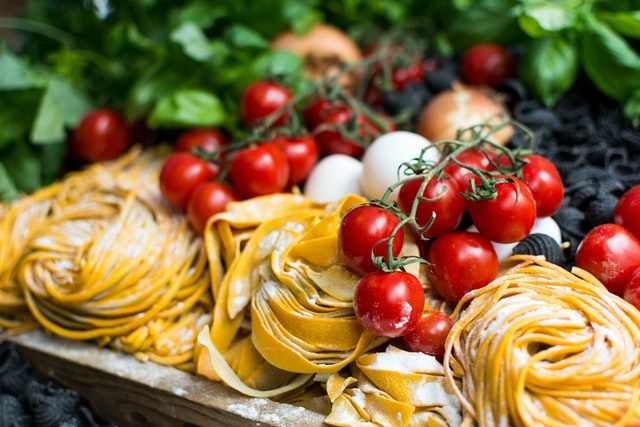
You don’t have to be a foodie to host an Italian, but you do need to address the food issue. Eating is different in the USA. We don’t tend to cook elaborate meals every day, and we might even eat alone and even whenever we get hungry (instead of following a strict meal schedule). The key is understanding cultural differences and talking about them. Italians come to the USA to learn new ways!
Family: Mamma and Papá?
Tight Italian families are another stereotype - and we can’t deny this one either. "Togetherness" is a theme for Italians. Mamma and Papá may need help cutting the apron strings at first. But don’t take it personally. They’re just fulfilling the roles they learned in their culture.
When you host an Italian student, prepare to Zoom with the entire family. The key is to establish and enforce healthy, weekly connections so your student can adapt to real life in the USA - without getting tangled up in apron strings.

Friends: Nicety or Necessity?
Like good Mediterraneans, Italian teenagers have been trained to invest deeply in life-long friendships. This is a family-and-friends-first culture. What does this mean to host families? You student will expect to make friends - lots of them - and this is part of the mix. Keep reading to see how this can enhance the exchange as long as you set proper limits that work for your family.
 Vanessa (far right) is living out her Italian values with so many wonderful new friends in Colorado.
Vanessa (far right) is living out her Italian values with so many wonderful new friends in Colorado.
Maturity: High or Low?
Exchange is a fascinating way to see how different cultures promote independence in different areas at different ages and stages. Most Italian kids arrive ready and raring to go: out on their own. Host families are often surprised by how independent they are compared to American kids their age. This intriguing cultural difference can be explored and managed to keep your exchange happy and fun for everyone involved. Keep reading.
Relationships: Close or Far?
In those movies with an Italian flair, are those chummy relationships real? This is yet another stereotype that has roots in reality: real values that shape relationships in Italy. People tend to enjoy very close, tight relationships with their family and friends. So, what does this mean for host families? Welcome to the inner circle!
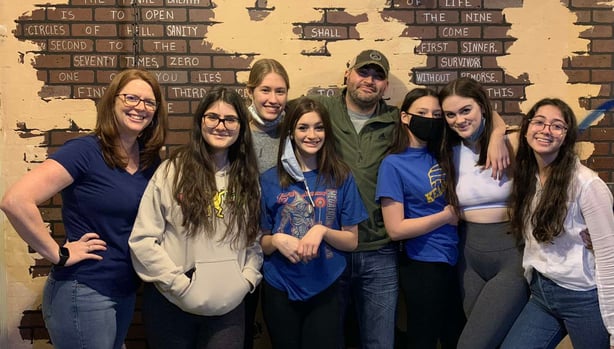 Alice (second from left) with host family and friends, enjoying time together.
Alice (second from left) with host family and friends, enjoying time together.
Technology: Yes or No?
And the big question: are Italian kids stuck to their phones and laptops like American kids? Of course! Just like teenagers around the world, kids from Italy need clear limits on technology use. This is a cultural similarity that host families can easily manage with students from Italy. Keep reading.

Ethnocentricity: Better or Worse?
Anthropologists call it ethnocentrism. It’s the natural human tendency to believe that our way - the way we learned in our own culture growing up - is the right way. Youth exchange exists to challenge us. More than one American host family has a funny tale to tell about the time they put Italian ethnocentrism to the test… Just one more fun reason to host a student from Italy.
Enrich Your Life
What happens when an Italian student comes to live with you? Life becomes richer and more interesting. Here are just a few things these students share with their host families:
Taste Italian Food
“The best part of hosting an Italian student is the food,” according to one member of ICES staff. Many of these kids know how to cook up some amazing dishes. Some of those recipes will have names you know - like pizza, spaghetti, gnocchi and the like - but also authentic Italian flavors you never imagined. Other items on your new menu might surprise you, but everything is guaranteed to be 100% delicious.

Talk about Italian Food
Italians don’t just eat, they talk about their food - with passion. Americans also talk about food, but our conversations often revolve around health benefits like vitamins, minerals, sugars and fats. In Italy, food is all about delight; good health is simply a byproduct of traditions that have evolved over thousands of years. So, however you like your food, prepare to have some new and different conversations about flavors, ingredients, cooking techniques and more.
Eat like Italians
Honestly, it’s not enough to try Italian food - and talk about it. Eating is a way of life in Italy. By American standards, it involves a rather predictable meal schedule, fresh ingredients, home-cooked meals, and above all: eating together. “An Italian student can definitely teach an American family our traditions, like sitting at the table all together and eating a warm meal,” explains Vanessa.
Your student from Italy will be honored to teach you how to eat like an Italian for a week. Try it and you may like it. Buon appetito!

Play like Italians
Italian students are known for bringing a spark of fun into their host families. “We are full of energy, ready for new adventures, really funny, and you never get bored,” according to Alice from Milan who is on exchange in Flint, Michigan this year. Enjoy simple family activities together: walks, running errands, meals together, board games, movie night, visiting grandparents. These kids like to be busy and it’s fun to share everyday, simple pleasures with them.
 Vanessa and host mom at the Grand Canyon, having fun together!
Vanessa and host mom at the Grand Canyon, having fun together!
Meet The Family
Have you watched “My Big Fat Greek Wedding”? You might experience an Italian version of this if you get to meet your new extended family on the other side of the world. Mamma and Papá will be right there, but what about grandparents, aunts, uncles and cousins? See if they'd like to make a Zoom appearance and you may soon be meeting a wide range of Italians from all branches of the family tree.
Share Your American Culture
Italians students tend to be very enthusiastic about American culture. This makes it especially fun to share your everyday life with an exchange student from Italy. Following are a few items for your bucket list when hosting Italian teenagers.
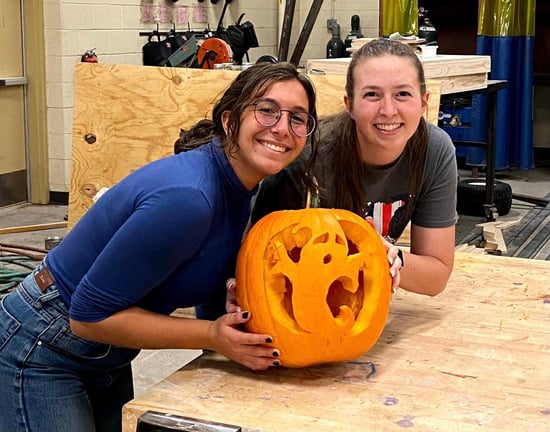 Vanessa loved carving a pumpkin in shop class at school for Halloween.
Vanessa loved carving a pumpkin in shop class at school for Halloween.
Italian student Vanessa loves these simple, fun activities:
- Banana Bread - baking with host mom is a delight for her.
- The Movies - going to a cinema after practice is a favorite.
- Movie Night - watching movies at home together is just as fun.
- Grocery Shopping - helping host mom on Saturdays is great.
- Sledding - snow time with host brothers is unforgettable.
- Singing in the car - it’s most fun when teasing host brothers.
“Americans can teach us a different lifestyle,” says Vanessa. “Everybody drives and they’re so independent! They can also teach us how to do practical things. I learned a lot about cows and farm life!”
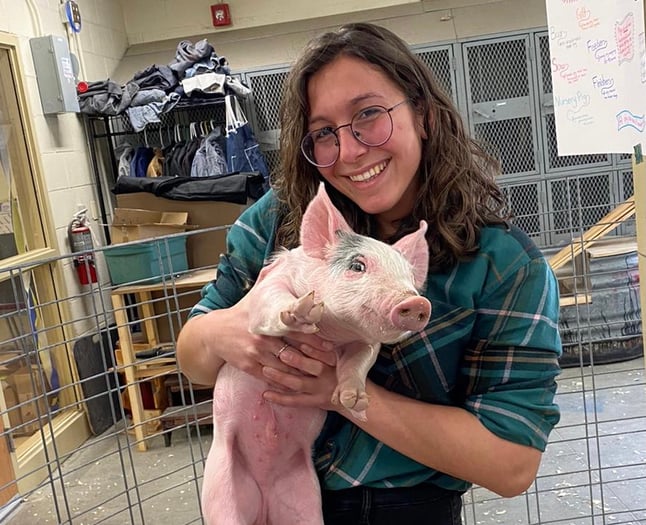 Life in rural America was an exciting adventure for Vanessa.
Life in rural America was an exciting adventure for Vanessa.
Alice's favorite activities included:
- Board games - playing Monopoly with her host family.
- Camping - living real adventures in a new country.
- Shopping - just going to the mall to shop and hang out.
- Roller skating - getting out for a little fun.
- Cooking - but doing it together with her host family.
- Eating out - enjoying fast food or trying new types of cuisine.
- Ice fishing - enjoying something different with her host sister.
- Friendship - making friends with new kids.
- Relatives - meeting the extended family.
- Holidays - celebrating with her host family was amazing.
Is Hosting an Italian Right for You?
Families evolve and change over time. Your family has its own personality and culture at this point in time. Italian exchange students tend to thrive with families like these...
- Action-Packed Families - These are busy, on-the-go families that love to be out and about. Sometimes the family does things together. Other times each person is free to do their own thing. But something is always going on, and Italians tend to love this.
- Big Families - These families tend to be entertaining due to sheer numbers: someone is always up to something. Big families with many children of any/all ages at home can be very exciting for Italian students who usually enjoy the hustle and bustle.
- Kid-Friendly Families - These families might not be large, but they have kids at home - or they have two international exchange students at once. Italian students tend to be good with small children and to enjoy having other teenagers around.
- Culture-Crossing Families - These are families that truly desire to learn about Italian culture. Some of these families travel, others do not, but they all love to learn about other countries and cultures. Most Italian students thoroughly enjoy sharing their rich culture and heritage, so this can be a match made in heaven.
- Foodie Families - These are families that love cooking and specifically choose an Italian who also loves to cook. On one hand they get to learn many new recipes from an authentic Italian chef. On the other hand, the student enjoys learning about American cuisine - and collecting recipes to take back home.
- Independent Families - These are families that promote independence and autonomy. They set limits, but don’t mind if the student spends lots of time at extracurricular activities and going out with friends. Young Italians tend to be pretty independent and thrive when allowed to organize their own life.
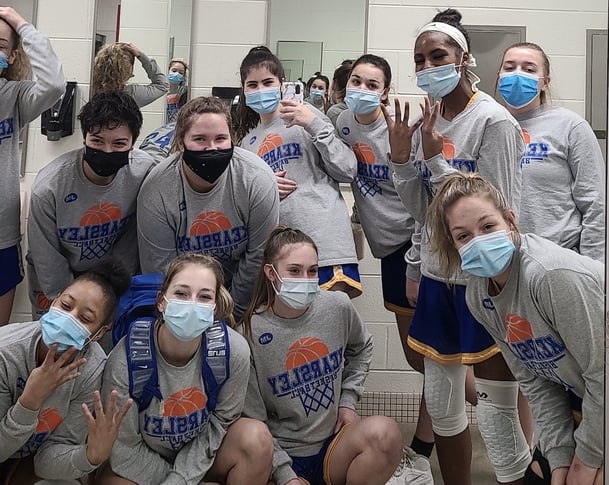 Basketball gave Alice a chance to balance family life with good friendships and fun.
Basketball gave Alice a chance to balance family life with good friendships and fun.
Enjoy Hosting Happily Ever After
What are the keys for living happily ever after with a student from Italy? Here's a list of tips from experienced ICES staff, with input from Vanessa and Alice...
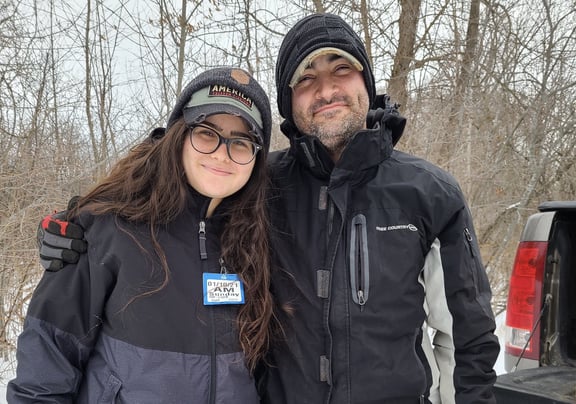 Alice with her host father. She fit right into her host family because they treated her just like the rest of their daughters, with all the same rights, rules and responsibilities.
Alice with her host father. She fit right into her host family because they treated her just like the rest of their daughters, with all the same rights, rules and responsibilities.
Share Your Rules
Generally, Italian teens are independent and expect more freedom than most teens get in the USA. The key is to map out your house rules in writing. Review them together one by one. Revisit the list weekly during the first month.
Explain Your Rules
The best way to help your Italian teenager adapt quickly to a whole new way of thinking and living is to explain your reasons why. They've been raised to politely discuss, debate and negotiate with adults. It only takes a little time to explain the rationale behind your American rules, but your efforts will go a long way.
Communicate Carefully (at first)
Even kids with excellent English need time to adapt to 24/7 with native speakers. We use idioms and figures of speech. We have accents, different tones of voice and even new body language to interpret. The key is to speak slowly at first - and check for understanding.
Be Open and Understanding
We asked Italian student Alice what advice she would give to American host families when living with kids from Italy. “Be open, ready to try new foods and have empathy because everything is new for the student.” (Interesting how food always makes it into the mix.)
Help Choose Friends
Italian teens are very friend oriented, so the key is to help them find friends you can trust. Another option is to talk this over. What are your expectations? What kinds of friends do you hope they will make? Which red flags should they look out for? Where can they find good friends you will feel comfortable letting them go out with?
“Honestly, I’d say that to be happy we need company, friends and activities,” explains Vanessa. “We like to be involved in school activities and sports, but at the same time we need our space and personal time to spend with friends, trying to have fun!”
 Vanessa (center) had no trouble making loads of friends in Colorado.
Vanessa (center) had no trouble making loads of friends in Colorado.
Talk about Trust
Italian exchange students are often baffled when perceive that their host parents “don’t trust them”. The problem is simple: they are used to greater autonomy and independence than is typically allowed by American parents. The key is to explain cultural differences and make your needs clear. What do you expect:
- Do you need to meet their friends before they make plans?
- Do you expect to be consulted and informed about any plans?
- What about changes in plans?
- How will your student ensure you can locate him/her at all times?
- How often should he/she check in with you?
Let Them Go
When you are sure your student is with “the right crowd”, try to give them a bit of freedom. Exchange is all about adapting to a new culture and your student knows that. Once you know for sure that you can trust your student to stick to the plan, keep you informed about any changes and answer your messages/calls at all times, it helps to loosen up just a bit.
 Vanessa won not only her host family's trust, but a Homecoming Queen crown!
Vanessa won not only her host family's trust, but a Homecoming Queen crown!
Keep Communicating
Italians tend to have a fairly direct communication style. Capitalize on this by talking about any issues or concerns you may have. And don’t wait. Daily communication is the best way to keep the channels open and reap the rewards of a close relationship with your Italian student.
Be Firm and Flexible
Many Italian kids have been raised to have a mind of their own, which makes hosting all the more interesting and fun. But always remember that your rules are The Rules. Be sure your student remembers this, and then choose to be flexible in the areas that don’t stretch your limits.
Eat Together
The best way to bond with your Italian student? You guessed it: enjoy eating meals together. This is how your teenager from Italy has learned to open up and share with other people. So, take advantage of this cultural exchange to bond over food. It will pay huge dividends.
Cook Together
Cooking together might be the second best way to bond with a teenager from Italy. This is just one more source of glue to bind your student together with your family, another way to invest and build trust and love.
 Vanessa and her family were able to take some trips, but you don't have to go anywhere to have a great time with your Italian student!
Vanessa and her family were able to take some trips, but you don't have to go anywhere to have a great time with your Italian student!
Have Fun TOGETHER!
Most importantly: have fun together (yes, with an emphasis on the together). Year after year, American host families report just how much fun it is to live with an Italian. These kids come equipped to form very tight bonds and a little love and fun go such a long way.
So, don’t hold back: light the fire, pull out the hotdogs and marshmallows, or break out the board games, watch movies together. Little things like this will warm your Italian student’s heart. And that’s the stuff exchanges are made of!



